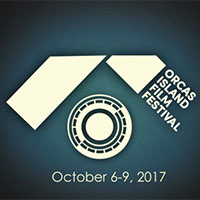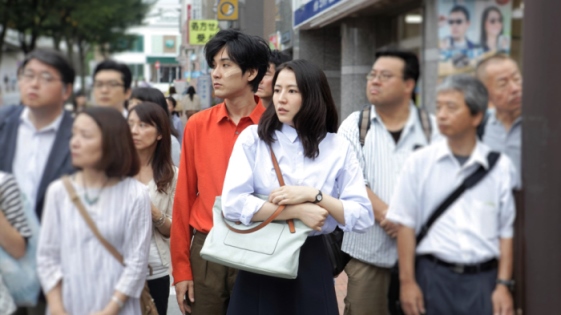–by Jule Treneer–
The original Japanese title of Kiyoshi Kurosawa’s “Before We Vanish” translates as something like “Invaders Taking a Walk”, which actually gives you a much better sense of what the film is like than the English title does. The new movie by the acclaimed art-house horror director, which screened at the Orcas Island Film Festival, is about a trio of aliens invading a small Japanese seaside town, except the film doesn’t seem to be in any particular hurry to get to the alien invasion part.
In terms of pacing, the movie starts out a bit deceptively with a jarring opening sequence culminating with a teenaged girl staggering down a highway, her school uniform all spattered with her family’s blood. The girl, we come to understand later, has just been possessed by an alien, one of an advanced party scouting out Earth for the invasion that will vaporize all humanity. But these are details that are doled out only gradually. From thereon in, the film slows way, way down, as if to take stock of the general weirdness of its premise. So we amble alongside the aliens, who are more befuddled than terrible, while they stumble around collecting “notions” from humans’ heads and try to get the gist of what life on Earth is all about.
Since most of us (humans) would also like to know what life on Earth is all about, this serves as a pretty satisfying premise for a sci-fi movie. It’s amusing enough to learn about the aliens’ plans as unhurriedly as the aliens go about satisfying their curiosity about us. This learning process, which involves the aliens coaxing people into picturing an idea in their minds so that they can pluck it from their heads, is clearly central to Kurosawa’s exploration of how received ideas can imprison us individually and as a society. Once liberated of such notions as “ownership”, “work” and “family”, the aliens’ victims are momentarily incapacitated, and sometimes seem relieved or even euphoric. What’s not so clear is whether this film by the director of such classics as “Cure” and “Bright Future”—with its lackadaisical pacing, curious shifts in tone, and unexplained character inconsistencies—is delightfully shambolic by design, or the happy result of benign neglect. Either way, there are enough absurd and dreadful moments to keep us absorbed all the way through the overly long third act with its cheesy computer-generated imagery (CGI).
It turns out the aliens take on something of the character of the people they possess, though it’s unclear if they’re totally aware of this. The results are by turns amusing and touching, especially as their relationships with their human “guides” develop. Two of them, who’ve inhabited teenaged bodies, are naturally the most nihilistic and violent. They team up with a cynical Tokyo news reporter, who agrees to serve as their guide in return for an exclusive. The third turns up in the body of an estranged husband, whose exasperated but loving wife puts up with his new alien personality, taking it for some sort of sudden mental illness. When her alien husband turns out sweeter than the original, the two grow closer as they make their way around the increasingly chaotic little town.
Science fiction set in the here and now must always contend with the earthly limitations of our politics and institutions, which are never quite up to the task of handling something so momentous as an alien invasion (unless the movie is set in the U.S. and the president can fly a fighter jet.) Kurosawa’s post Fukushima Japan is no exception. Here, even the usually competent government men in black vehicles, though always listening, seem to glean nothing useful for all their intelligence. Ultimately, for Kurosawa, it’s love and sacrifice, not heroics that wins out. Indeed, the sentimental twist at the end of the film would not feel out of place in a more conventional movie. Some “notions” play well both in the art house and in Hollywood.
Jule Treneer is a writer and financial advisor. He is co-founder of the Orcas Island Lit Fest.
**If you are reading theOrcasonian for free, thank your fellow islanders. If you would like to support theOrcasonian CLICK HERE to set your modestly-priced, voluntary subscription. Otherwise, no worries; we’re happy to share with you.**









